Sarah Sundin's Blog, page 528
March 18, 2011
Today in World War II History
70 Years Ago—Mar. 18, 1941: US and Canada sign joint defense pact.
Published on March 18, 2011 03:00
March 17, 2011
Today in World War II History
70 Years Ago—Mar. 17, 1941: British begin to ration jam & marmalade (8oz per month). National Gallery of Art opens in Washington DC.
Published on March 17, 2011 03:00
March 16, 2011
Book Club Beat - Same Kind of Different as Me
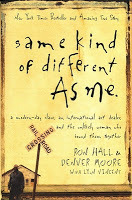 Welcome to Book Club Beat, where book clubs share about their discussions.
Welcome to Book Club Beat, where book clubs share about their discussions.Book club name and/or location: Bibliovores, northern California.
Title and Author: Same Kind of Different as Me, by Ron Hall, Denver Moore, and Lynn Vincent.
What it's about:
A true story. Denver Moore grew up in Louisiana in the 1960's, working on a plantation as a modern-day slave. Ron Hall is an international arts dealer who moves between upscale New York galleries and celebrities. It seems unlikely that these two men would meet under normal circumstances. Until Deborah Hall, Ron's wife meets Denver and sees him through God's eyes of compassion. When Deborah is diagnosed with cancer she charges Ron with the mission of saving Denver. From this request, an extraordinary friendship forms between Denver and Ron, changing them both forever.
Were discussion questions available? Were they helpful?
Yes, in the back of the book. However, the book generated so much discussion, we didn't need the questions.
What we liked about the book:
Everything. The book was beautifully written. It alternated between Ron's and Denver's stories—each voice unique and engaging. So many lines were hysterically funny, but we were all moved to tears as well. Most of all, the story drew us in, made us care, and challenged our attitudes. We loved seeing how God worked in each person's life, how He spoke to them, how they obeyed—and the amazing results of that obedience.
Anything we would change about the book?
No.
Fun connections (did the story inspire food, decorations, etc.?):
Nothing directly related to the story. We did enjoy delicious corned beef and cabbage to celebrate St. Patrick's Day.
Deep connections (this story made us think about the following discussion topics):
The book made us think about our attitudes toward the homeless, people different from us, and how we respond to God when tragedy strikes. We discussed how God calls each of us to different ministries. Not all of us are called to work directly with the homeless, but we're each called to do something—and we'd better do it! And we're each called to see all human beings as precious to the Lord and treat them accordingly.
Do you recommend this book for other book clubs?
Absolutely.
If you belong to a book club and would like your group to be featured on this blog, let me know! Pictures of the book club can be included if you'd like. Christian or "clean secular" fiction/nonfiction only please. The questionnaire is short, and I'll obtain the book cover and story blurb.
If you're looking for a book club, check out the Book Club Network at http://www.bookfun.org/ , an on-line meeting place for Christian book club members and authors. Over 900 members and it's only a few months old! Join the fun!
Published on March 16, 2011 05:00
Today in World War II History
70 Years Ago—Mar. 16, 1941: U-100 first sub tracked by radar—attacked and sunk by British ship HMS Vanoc. In first successful amphibious landing of the war, British and Indian troops land at Italian-occupied Berbera in British Somaliland.
Published on March 16, 2011 03:00
March 15, 2011
Today in World War II History
70 Years Ago—Mar. 15, 1941: German battlecruisers Scharnhorst and Gneisenau sink 16 British ships in convoy over next two days. Severe blizzard in North Dakota and Minnesota kills 151. New songs in Top Ten: "Amapola" and "Georgia on My Mind."
Published on March 15, 2011 03:00
March 14, 2011
Make It Do - Rationing of Fats & Oils in World War II
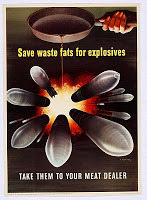 Rationing was part of life on the US Home Front during World War II. Along with gasoline, sugar, coffee, processed foods, meat, and cheese—fats and oils were rationed. To help produce the glycerin needed by the military, housewives also collected kitchen waste fats.
Rationing was part of life on the US Home Front during World War II. Along with gasoline, sugar, coffee, processed foods, meat, and cheese—fats and oils were rationed. To help produce the glycerin needed by the military, housewives also collected kitchen waste fats.Why Fats?
Shortages of butter and oils began early in the war. Most cooking oils came from Pacific lands conquered by the Japanese, and the supply plummeted. Fats were also needed in higher quantities for industrial and military use. For example, the Navy used lard to grease their guns. In addition, the United States provided the fats needed by many of our allies for military and civilian use.
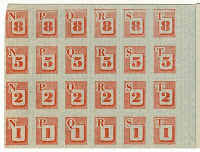
Rationing of Fats and Oils
By Christmas of 1942 a serious shortage of butter and other fats developed. The Office of Price Administration added butter, fats, and oils to rationing on March 29, 1943. Points were assigned to each type of fat based on scarcity. Grocery stores posted the required ration points along with prices. Lard was removed from rationing on March 3, 1944 and shortening and oils on April 19, 1944, but butter and margarine were rationed until November 23, 1945. Butter required a higher number of points than margarine, so "oleo" margarine became more popular. Naturally white, oleo came with a packet of yellow food coloring to mix in.
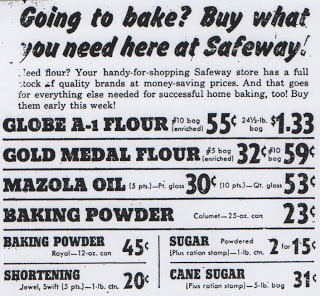
Ration Books
Ration Books Two, Three, and Four included blue stamps for processed foods and red stamps for meat, cheese, and fats. Each person received 64 red stamps each month, providing about 12 pounds of fats per year.
Glycerin Shortage
The vital substance of glycerin comes from fats. In the United States, most glycerin came from the production of soap—when fats and lye are combined, soap and glycerin are formed. Glycerin is a crucial ingredient in the manufacture of explosives such as nitroglycerin. It was also needed for other military uses—as a lubricant, in protective paint for planes and tanks, in hydraulics, in the production of cellophane for food wrappers, and in dyes for uniforms. In addition, glycerin is vital in pharmaceuticals as a solvent, protectant, and emollient. To free up some of the supply, glycerin use was restricted or removed from civilian products such as beverages, gum, antifreeze, tobacco, cosmetics, lotions, soaps, and shampoo. Pharmacists learned to use other solvents to make suspensions and elixirs. However, more glycerin was needed, so America turned to the housewife to provide more fats.
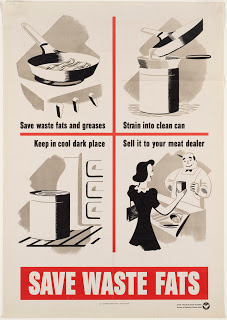
"Pass the Grease and Make the Ammunition"
"One tablespoonful of kitchen grease fires five bullets." "One pound of kitchen fats makes enough dynamite to blow up a bridge." Slogans like these prompted housewives to salvage cooking fats. In June of 1942, a national program was begun for collection—but it still wasn't enough. To reward collection, starting in December of 1943, housewives received 2 red ration points and 4 cents for each pound of grease.
How were waste fats collected?
Housewives saved fats trimmed from meat (boiled down), pan juices, skimmings from stews and gravies, even water from boiling sausage (chilled and skimmed). The grease had to be free of water and juice, strained through a fine-mesh sieve to remove impurities, and stored in a cool and dry place, preferably refrigerated. When a pound had been collected in a tin can, the housewife took it in to her grocer or butcher, who would return her tin can—tin was scarce too!
How would you deal with rationed butter and oils—or saving your kitchen grease?
Published on March 14, 2011 05:00
Today in World War II History
70 Years Ago—Mar. 14, 1941: Japanese fighters raid Chengtu, China in longest range for fighter operation of war so far.
Published on March 14, 2011 03:00
March 13, 2011
Today in World War II History
70 Years Ago—Mar. 13, 1941: Luftwaffe bombs Scotland during night; Clydeside and Glasgow hit hard; 460 killed.
Published on March 13, 2011 03:00
March 12, 2011
Blogoversary Giveaway Winners
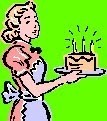 Thanks, everyone, for celebrating my second blogoversary with me! Seventy people left comments on posts this week, either on the blog or on Facebook, so I decided to give away three books. My random number generator (my teen daughter, who prides herself on being random) pulled three names from a bowl: Katers, Leticia Glidewell, and Nora St. Laurent. Ladies, I've sent you each a message on Facebook.
Thanks, everyone, for celebrating my second blogoversary with me! Seventy people left comments on posts this week, either on the blog or on Facebook, so I decided to give away three books. My random number generator (my teen daughter, who prides herself on being random) pulled three names from a bowl: Katers, Leticia Glidewell, and Nora St. Laurent. Ladies, I've sent you each a message on Facebook.May God bless you greatly!
Published on March 12, 2011 17:36
Giveaway...Haven't Forgotten...
You may think I've forgotten to post the winner for this week's blogoversary giveaway. Not quite. Worked late last night, and now I'm off to my son's baseball practice and book club! I'll post it later today. Sorry for the wait.
Published on March 12, 2011 08:39



